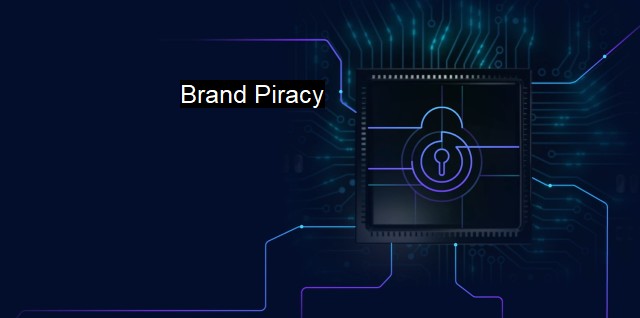What is Brand Piracy?
Combatting Brand Piracy: The Cybersecurity Industry's Growing Concerns on Counterfeit Applications, Fraudulent Products, and Malware Disguised as Reputable Brands
Brand piracy, in the cybersecurity realm, refers to various actions where unauthorized entities imitate a genuine brand unfairly. This wrongful behavior is primarily carried out to exploit the reputation of an established brand or to deceive consumers, luring them into believing they are buying or using products or services from the real brand. This often results in severe monetary losses for legitimate businesses and can potentially lead to a tarnished reputation for the real brands, which takes significant time and effort to rectify.Brand piracy has become an increasing concern with the rise of digital platforms, particularly as most shopping and communications shifted online due to the COVID-19 pandemic, and added a stroke of urgency to further create awareness about it. Criminals exploit these platforms to pose as fake retailers, offer counterfeit goods, or launch attacks that often breed chaos and insecure digital spaces. In such an environment, antivirus programs and cybersecurity measures become crucial to curb brand piracy.
Although brand piracy in the digital sphere can be multifaceted and rather complex, most instances revolve around the creation of forged or fake websites, harmful software downloads, misleading emails or phishing attempts, phony social media profiles, illegitimate ads, and counterfeit marketplaces.
Fake websites perfectly mimic the appearance of a legitimate brand's site to trick users. They lure users into submitting personal information, including payment details. They are especially crafty during high-traffic shopping seasons, taking advantage of overwhelmed or hurried shoppers.
In the case of harmful software downloads, users might believe they are downloading legitimate software but are instead downloading malware. This malware might steal sensitive data or disrupt the device's functionality.
Phishing attempts through misleading emails or text messages impersonate a brand to deceive users into revealing sensitive data, such as usernames, passwords, and credit card numbers. They might falsely claim an account compromise or a necessary password reset to entice the users.
Fake social media profiles can exploit a brand's likeness to send scam messages, post dangerous links, or promote counterfeit products. Similarly, illegitimate ads can leverage social media, popular websites, or search engines to promote counterfeit goods or phishing links to unsuspecting users.
Lastly, counterfeit marketplaces sell imitations of real products under the pretense of a legitimate brand, pulling away potential customers and profiting from the genuine brand's identity, image, and reputation.
In this war against brand piracy, having robust antivirus programs and cybersecurity measures to protect a brand's online identity is indispensable. Cybersecurity systems need to be equipped with the ability to detect and respond to suspicious activities almost instantaneously, including detecting fraudulent websites, fake emails, counterfeit goods, scam messages, and dangerous links.
Antivirus programs provide digital security barriers to prevent illegal downloads that may surreptitiously carry harmful malware or ransomware. These programs not only safeguard devices from virus attacks but also offer an intricate layer of protection that cleans and immunizes against potential future threats.
Brand piracy remains a serious cybersecurity concern. The situation divulges its indecipherable complexity every time culprits resort to advanced tactics. Thus, investing in top-notch antivirus software and effective cybersecurity measures reduces the risk of falling victim to such meticulous cyber abuses, allowing brands to maintain clarified brand integrity, secure consumer trust, and ensure untarnished corporate reputations.

Brand Piracy FAQs
What is brand piracy in the context of cybersecurity and antivirus?
Brand piracy refers to the unauthorized use of a company's brand to deceive customers and profit illegally. In the context of cybersecurity and antivirus, it can refer to the use of fake antivirus software or other fraudulent programs that use a trusted brand name to trick users into downloading malware.How does brand piracy affect cybersecurity and antivirus?
Brand piracy undermines trust in legitimate brands and makes it harder for users to distinguish between genuine and fake products. This can lead to users inadvertently downloading malware or other harmful programs, which can compromise their cybersecurity and lead to data breaches or other forms of cybercrime.What can companies do to protect themselves from brand piracy in the context of cybersecurity and antivirus?
Companies can take several steps to protect themselves from brand piracy, including monitoring the marketplace for fake products, registering trademarks and copyrights, and educating customers about how to spot fakes. In addition, companies can work with cybersecurity experts to identify and remove fraudulent listings and take legal action against those responsible for brand piracy.What can users do to protect themselves from brand piracy in the context of cybersecurity and antivirus?
Users can protect themselves from brand piracy by taking care to download software only from trusted sources and avoiding suspicious websites or links. They can also keep their antivirus software up-to-date and be wary of any notifications or pop-ups that prompt them to download software or enter personal information. Finally, users should report any suspicious activity or brand piracy to the relevant authorities or the company whose brand is being used illegally.| | A | | | B | | | C | | | D | | | E | | | F | | | G | | | H | | | I | | | J | | | K | | | L | | | M | |
| | N | | | O | | | P | | | Q | | | R | | | S | | | T | | | U | | | V | | | W | | | X | | | Y | | | Z | |
| | 1 | | | 2 | | | 3 | | | 4 | | | 7 | | | 8 | | |||||||